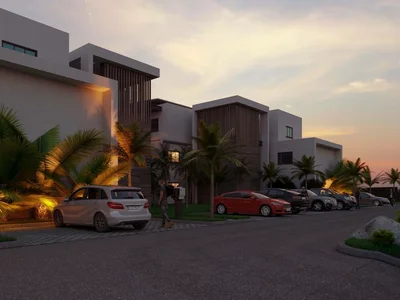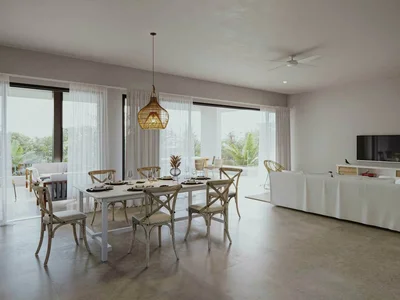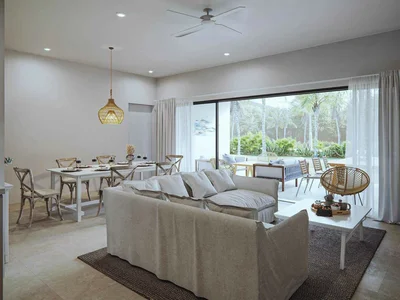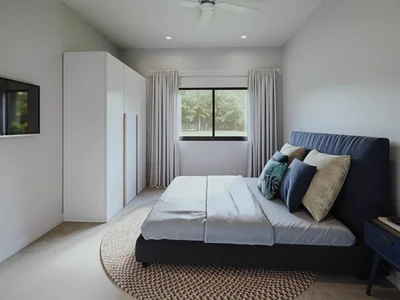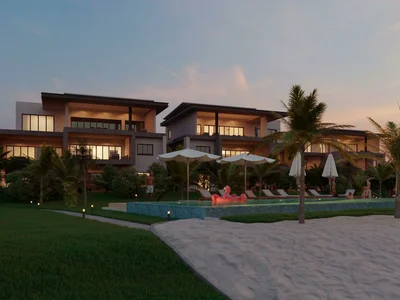Mauritius is part of the Mascarene Islands archipelago and is its largest and most populous member, with 1.26 million people covering an area of approximately 2,000 km². Despite its remoteness from the shores of Africa (over 1,000 km), it is in its eastern part, leading in economic wealth.
Benefits of Buying Real Estate from a Developer in Mauritius
Despite the modest land fund, real estate from the developer in Mauritius steadily fills the local real estate market. However, due to strong winds, high-rise buildings are built less often, which is why the most common type of new buildings are villas.
Advantages of buying properties in Mauritius:
- Residence permit for investment. Since 2015, foreigners who invest at least $375,000 in local real estate can obtain a permanent residence permit valid for up to 20 years with the right to extend.
- Tax incentives. No capital gains or inheritance tax, and a flat 15% income tax for residents.
- Exclusive projects. Developers such as Beachcomber and Omnicane offer complexes with access to private beaches and world-class golf courses such as Mont Choisy Golf Course.
Features of New Real Estate in Mauritius
New buildings in Mauritius are adapted to the local climate. There are no distinct seasons here, and the temperature is in the range of +10–35°C. However, there is a strong wind and high humidity. Therefore, local properties are protected from moisture, do not turn on the heating system, but use air conditioners to cool the air.
Another important feature is the legal nuances of the transaction. Before buying real estate in Mauritius from a developer, you need to check whether the developer has a license and the right to sell real estate to foreigners. If so, you need to check the project itself, whether it is approved by the Economic Development Board (EDB) and whether it is sold under PDS/IRS/RES. Both should be indicated in the characteristics of the property or documentation for it.
If everything is in order, you or the agent through whom you are purchasing the property must inform the developer of your intentions. After this, the developer himself prepares a package of documents and submits an application to EDB Mauritius so that you are allowed to apply for the purchase of the property.
If approved, you transfer the full amount of the transaction (or part of it under VEFA) to the escrow account specified in the contract and sign the deed of sale (Notarial Deed) with a local notary. The notary himself registers the transaction in the Land Registry (cadastre) and gives you copies of the registered deed. From this moment on, you become the official owner of the property with the right of ownership.
Cost of New Housing in Mauritius
The cost of local housing varies little by region, but depends greatly on the type of property and its stage of completion. The average price per square meter in new buildings is 184,496–216,509 MUR (approximately $3,700–4,300), and in elite properties — +$6,000 per m².
Average cost of new housing in Mauritius:
| Region | Price per m², MUR | Price per m², $ |
| Grand Bay | 200,000–250,000 | 4,000–5,000 |
| Pereybere | 190,000–240,000 | 3,800–4,800 |
| Flic en Flac | 170,000–210,000 | 3,400–4,200 |
With the start of the tourist boom in Mauritius, the average annual growth in property prices increased by 11.3% from 5-7% to 7-9% per year. The greatest increase in prices is observed in Port Louis, Quatre Bornes Vacoas-Phoenix and Curepipe. The first is due to the already dense development and status of the capital, and the next three have effectively merged into a single settlement and have almost exhausted the land fund, which is why demand significantly exceeds supply.









